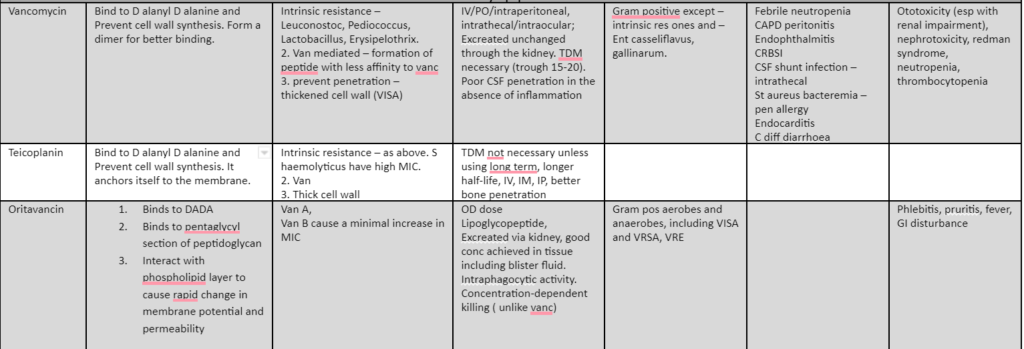What resources do I need to use for FRCPath Microbiology?
FRCPath Microbiology questions are heavily drawn from British and some international guidelines, recent developments relevant to the UK, and recent journal articles (review, meta-analysis, important research articles). Reading books may not be sufficient for these exams, especially for part 2.
Here is a list of resources that you should read -
Curriculum
You must go through the curriculum to know what to read. To start preparing for the exam without knowing what to read could lead to a terrible outcome.
- https://www.rcpath.org/trainees/training/training-by-specialty.html
- https://www.rcpath.org/trainees/training/training-by-specialty/medical-microbiology-2021.html
Antibiotic
1. BNF
Get a list of antibiotic that we use in the UK - you must read these antibiotics
You can find a list of antibiotics made from BNF in this google sheet. Make a copy for yourself.
How to do it - here is an example

2. FDA and PEW trust
Here you can find recently approved and pipeline antibiotics which are also important for the examination. Pay special attention to the recently approved antibiotics. Pipeline antibiotics are less important.
- https://www.fda.gov/drugs/development-approval-process-drugs/new-drugs-fda-cders-new-molecular-entities-and-new-therapeutic-biological-products
- https://www.pewtrusts.org/en/research-and-analysis/data-visualizations/2014/antibiotics-currently-in-clinical-development?utm_campaign=LM+-+ARP+-+Innovation+Update+March+2021+-+3+11+21&utm_medium=email&utm_source=Pew
Vaccine
Greenbook
Greenbook is a series of documents which gives you most if not all the information about vaccines.
https://www.gov.uk/government/collections/immunisation-against-infectious-disease-the-green-book
Immunoglobulin handbook
https://www.gov.uk/government/publications/immunoglobulin-when-to-use
National SMI & EUCAST
These are the most important documents for the laboratory aspect of microbiology. National SMI will give you information on processing specimens, laboratory tests, staining, and syndromic algorithm - this is the standard we follow in the UK. You must read these documents.
https://www.gov.uk/government/collections/standards-for-microbiology-investigations-smi
EUCAST is the standard used for sensitivity tests. For the FRCPath microbiology, this standard should be followed (not CLSI).
Reference laboratory user manuals
The UK has several reference laboratories which support the local laboratories. There are valuable pieces of information in these laboratories' manuals. You may find information about typing, reference range and the tests available. You may wish to note what tests are available for individual organisms and diseases.
- https://www.gov.uk/guidance/specialist-and-reference-microbiology-laboratory-tests-and-services
- https://www.gov.uk/government/publications/bacteriology-reference-department-brd-user-manual
- https://www.gov.uk/government/publications/virus-reference-department-vrd-user-manual
- https://www.lshtm.ac.uk/research/faculties/itd/teaching-and-diagnostic-unit/diagnostic-parasitology-laboratory
- https://www.nbt.nhs.uk/severn-pathology/pathology-services/antimicrobial-reference-laboratory/antimicrobial-reference-laboratory-resources
Laboratory safety and quality
- https://www.hse.gov.uk/pubns/clinical-laboratories.pdf
- https://www.hse.gov.uk/biosafety/laboratories.htm
- https://www.hse.gov.uk/biosafety/management-containment-labs.pdf
- Quality manual – https://mft.nhs.uk/app/uploads/2021/02/Manchester-Quality-Manual.pdf
- Hospital safety – https://www.aintreehospital.nhs.uk/media/11602/ii-health-safety-policy-ii-gen-pol-2-v2.pdf.
Laboratory reporting to public health:
- https://assets.publishing.service.gov.uk/government/uploads/system/uploads/attachment_data/file/926838/PHE_Laboratory_reporting_guidelines_October-2020-v3.pdf
- KAI, KPI: https://www.rcpath.org/profession/guidelines/kpis-for-laboratory-services.html
- ACDP: https://www.gov.uk/government/groups/advisory-committee-on-dangerous-pathogens
Infection control
- epic3: National Evidence-Based Guidelines for Preventing Healthcare-Associated Infections in NHS Hospitals in England
- National Infection Prevention and Control Manual
- Healthcare infection society guidelines
Health Technical Memoranda (HTM)
https://www.england.nhs.uk/estates/health-technical-memoranda/
Health Building Notes
https://www.england.nhs.uk/estates/health-building-notes/
Guidelines
- NICE – https://www.nice.org.uk/guidance
- BIA guideline list – https://www.britishinfection.org/guidelines-resources/published-guidelines
- HIS guidelines – Healthcare infection society guidelines
- BASHH guidelines – https://www.bashh.org/guidelines
- BHIVA guidelines – https://www.bhiva.org/guidelines
- UK CVN guidelines – http://www.clinicalvirology.org/guidelines/
- British Transplantation Society guidelines – https://bts.org.uk/guidelines-standards/
- Health protection A to Z – https://www.gov.uk/topic/health-protection/infectious-diseases
- British Society of Rheumatology – https://www.rheumatology.org.uk/practice-quality/guidelines
- British Society of Haematology – https://b-s-h.org.uk/guidelines/
- British Thoracic Society – https://www.brit-thoracic.org.uk/quality-improvement/guidelines/
- Royal College of Obstetricians and Gynaecologists – https://www.rcog.org.uk/guidelines
- IDSA – https://www.idsociety.org/practice-guideline/practice-guidelines/
- ESCMID – https://www.escmid.org/guidelines_publications/guidelines/
- Guidelines.co.uk – https://www.guidelines.co.uk/
- Uptodate – https://www.uptodate.com/contents/search
- BMJ Best Practice – https://bestpractice.bmj.com/info/
- Microguide example – https://viewer.microguide.global/GHNFT/ADULT
Updates and journals
These websites will give you information on what is happening in the UK—regulatory updates, approvals, new adverse effects etc. I recommend checking this website and going back a year from your examination date, especially if you are preparing for part 2.
MHRA
https://www.gov.uk/government/organisations/medicines-and-healthcare-products-regulatory-agency
CAS alert
https://www.cas.mhra.gov.uk/Home
HPR
https://www.gov.uk/health-and-social-care/health-protection
Journals
The Journal of Hospital Infection
Journal of Antimicrobial Chemotherapy

